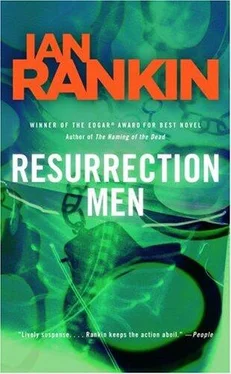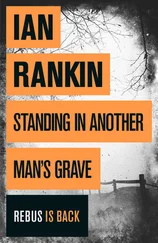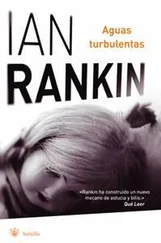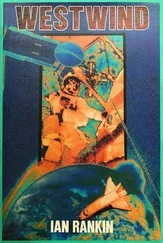“So?”
“So there are things I need . . .”
Jazz signaled, pulled over. They were approaching Haymarket. “All right making your own way back from here, John?”
“If that’s what’s on offer,” Rebus said, opening his door. Gray’s hand closed like a vise around his forearm.
“We’re very disappointed in you, John.”
“I thought we were a team, Francis,” Rebus told him, twisting free of his grip. “You want to walk into that warehouse, it’s fine by me. But they’ll catch you and they’ll put you away.” He paused. “Maybe another scheme will come along.”
“Aye, right,” Gray said. “Don’t call us and we won’t call you . . .” He leaned back and pulled Rebus’s door closed. The car took off again, leaving Rebus watching from the pavement.
That was it then. He’d blown it. He was never going to win them back, never going to find out the truth about Bernie Johns. And on top of all that, it might just turn out that they were on to him . . .
“Fuck it,” he said, wishing he’d never said yes to Strathern. He’d never meant for them to agree to his scheme. It was a way of getting them to open up about themselves. Instead of which, they were closing ranks, excluding him. The course had one more week to run. He could pull out now, or see it through to the end. It was something he’d have to consider. If he failed to see it through, whatever suspicions the trio harbored would appear confirmed. He turned and found that he was standing outside a pub. What better way to ponder the conundrum than over a pint and a double malt? With any luck, the place would do food too. They’d call him a cab afterwards to see him home. His problems would all have disappeared . . .
“I’ll drink to that,” he told himself, pushing open the door.
It was two in the morning when the phone woke him. He was lying on the living room floor, next to the hi-fi, CD cases and album sleeves spread around him. He crawled on hands and knees to his chair and picked up the receiver.
“Yes?” he croaked.
“John? It’s Bobby.”
Rebus took a moment to realize who Bobby was: Bobby Hogan, Leith CID. He tried focusing on his watch.
“How soon can you get down here?” Hogan was asking.
“Depends where ‘here’ is.” Rebus was doing a stock check: head cloudy but bearable; stomach queasy.
“Look, you can go back to bed if you like.” Hogan starting to sound aggrieved. “I thought maybe I was doing you a favor . . .”
“I’ll know that when you tell me what it is.”
“A floater. Pulled him out of the docks not fifteen minutes ago. And though I haven’t seen him in a while, he looks awfully like our old pal the Diamond Dog . . .”
Rebus stared down at the album sleeves, not really seeing them.
“You still awake, John?”
“I’ll be there in twenty minutes, Bobby.”
“He’ll be on his way to the mortuary by then.”
“Even better. I’ll meet you there.” Rebus paused. “Any chance of this being an accident?”
“At this stage, we’re supposed to be keeping an open mind.”
“You won’t be too bothered if I don’t do the same?”
“I’ll see you at the Dead Center, John . . .”
“Dead Center” was what they called the mortuary. One of the workers there had come up with the phrase, telling everyone that he was proud to work “at the dead center of Edinburgh.” The building was tucked away on the Cowgate, one of the city’s more secretive streets. Few pedestrians ever found themselves there, and the traffic was intent on being elsewhere. Things might change when the parliament opened its new building, less than a ten-minute walk away. More traffic, more tourists. At this time of night, Rebus knew the drive would take him five minutes. He wasn’t sure his blood alcohol level would pass muster, but after a quick shower he made for his car anyway.
He didn’t know what he was thinking or how he was feeling about Dickie Diamond’s death. Hard to say how many enemies had been harboring their festering thoughts, just waiting for the night when they clapped eyes on Diamond again.
He cut across to Nicolson Street and headed for the city center, turning right at Thin’s Bookshop and taking the steep turn down to the Cowgate. A couple of taxis: a few drunks. Dead center, he was thinking. He knew the easiest way into the mortuary this time of night was the staff entrance, so he parked outside, making sure he wasn’t blocking the loading bay. For a long time, they’d had to carry out actual autopsies at one of the city’s hospitals, due to the lack of a decent air-filtering system in the mortuary’s autopsy suite, but that had been remedied now. Rebus walked into the building and saw Hogan in the corridor ahead of him.
“He’s in here,” Hogan said. “Don’t worry, he wasn’t long in the water.” Good news: the body underwent terrible changes after lengthy submersion. The short corridor led directly into the loading area, which itself led directly to the holding area — a wall of little doors, each one opening to reveal a trolley. One trolley was sitting out, a polythene-wrapped body lying on it. Dickie Diamond was still wearing the same clothes. His wet hair was slicked back from his face, and there was some kind of algae stuck to one cheek. His eyes were closed, mouth open. The attendants were readying to take him upstairs in the elevator.
“Who’s doing the cutting?” Rebus asked.
“They’re both on tonight,” Hogan told him. Meaning: Professor Gates and Dr. Curt, the city’s chief pathologists. “It’s been a busy one: drug overdose in Muirhouse, fatal fire in Wester Hailes.”
“And four naturals,” an attendant reminded him. People dying of old age, or in the hospital. Mostly they ended up here.
“Shall we go up?” Hogan asked.
“Why not?” Rebus said.
As they climbed the stairs, Hogan asked about Diamond. “You lot were just interrogating him, weren’t you?”
“Interviewing him, Bobby.”
“As a suspect or a witness?”
“The latter.”
“When did you let him go?”
“This afternoon. How long had he been dead when you fished him out?”
“I’d say about an hour. Question is: did he drown?”
Rebus shrugged. “Do we know if he could swim?”
“No.”
They’d entered a glass-fronted viewing area. There were a couple of benches for them to sit on. On the other side of the glass, people moved around in surgical gowns and green Wellingtons. There were two stainless-steel slabs, with drainage holes and old-fashioned wooden blocks for the head to rest on. Gates and Curt waved a greeting, Curt gesturing for the two detectives to come join the fun. They shook their heads, pointing to the benches to let him know they were fine where they were. The body bag had been removed, and now Dickie Diamond’s clothes were being discarded, placed in their own plastic bags.
“How did you ID him?” Rebus asked.
“Phone numbers in his pocket. One was for his sister. I recognized him anyway, but she did the formal ID downstairs just before you got here.”
“How was she?”
“She didn’t seem too surprised, to be honest. Maybe she was just in shock.”
“Or maybe she’d been expecting it?”
Hogan looked at him. “Something you want to tell me, John?”
Rebus shook his head. “We reopened the case, went sniffing. Malky, the nephew, told Dickie what was happening. He came haring up here. We picked him up.” He shrugged. “End of story.”
“Not as far as someone was concerned,” Hogan said, peering through the glass as one of the attendants lifted something from the clothing. It was the revolver Diamond had pointed at Rebus. The attendant held it up for them to see.
Читать дальше












